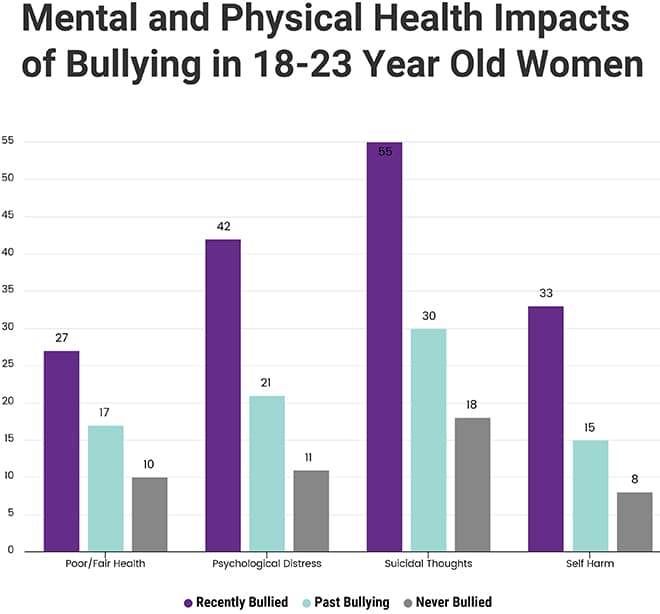
Almost one in five 18-23 year old women has experienced bullying, resulting in serious physical and mental health issues

Almost one in five 18-23 year old women was bullied recently and more than half had been bullied in the past, resulting in serious physical and mental health issues according to research from the University of Newcastle.
Lead author Natalie Townsend, from the Research Centre for Generational Health and Ageing and Hunter Medical Research Institute Public Health Program, said it was very concerning that more than half of the women who were bullied recently had suicidal thoughts, and a third had self-harmed.
“Women who experienced bullying reported worse general health, higher levels of psychological distress and were more likely to smoke, take illicit drugs and be overweight or obese,” Ms Townsend said.
Co-author Professor Deborah Loxton said policymakers and healthcare professionals urgently needed to recognise the scale of the problem and take action: “We need to provide interventions and ongoing support and treatment for adults.”
This is the first study to look at the health impact of bullying in adult women at national level rather than focusing on a particular industry or workplace setting.
The researchers surveyed 16,801 women aged between 18 and 23 who participate in the Women’s Health Australia study (Australian Longitudinal Study on Women’s Health).
Compared to women who had never experienced bullying, those recently bullied were:
Twenty-seven per cent of the recently bullied women reported their general health as ‘fair’ or ‘poor’ compared with 10 per cent of women never bullied. The physical impact was long lasting, with 17 percent of women bullied in the past reporting their health as ‘fair’ or ‘poor’.
“It’s important to understand that even when bullying isn’t physical, the experience still has a long lasting effect on physical health, not just mental health, Ms Townsend added. “Our bodies’ physical and hormonal response to stress can increase the risk of chronic disease and trigger the onset of predisposed conditions.”
This research is published in the Australia and New Zealand Journal of Public Health.
Natalie Townsend and Professor Deborah Loxton are from the University of Newcastle Priority Research Centre for Generational Health and Ageing and Hunter Medical Research Institute Public Health Program. HMRI is a partnership between the University of Newcastle, Hunter New England Health and the community.

HMRI would like to acknowledge the Traditional Custodians of the land on which we work and live, the Awabakal and Worimi peoples, and pay our respects to Elders past and present. We recognise and respect their cultural heritage and beliefs and their continued connection to their land.

Hunter Medical Research Institute
We’re taking healthy further.
Locked Bag 1000
New Lambton
NSW, Australia, 2305



This site is protected by reCAPTCHA and the Google Privacy Policy and Terms of Service apply.
Copyright © 2024 Hunter Medical Research Institute | ABN: 27 081 436 919
Site by Marlin Communications
